Letter from Charles Stille to George Ellis

Scholar Charles Janeway Stille writes to clergyman George Edward Ellis about Stille's biography of John Dickinson. Stille is having difficulty getting access to sources held by private collectors.


Scholar Charles Janeway Stille writes to clergyman George Edward Ellis about Stille's biography of John Dickinson. Stille is having difficulty getting access to sources held by private collectors.

Hugh Henry Brackenridge's memoir of Charles Nisbet, received in "The Historical Society" on January 22, 1883. This transcript was copied by Professor Joshua Allen Lippincott (class of 1858).

John Carson writes to Robert McPherson, a member of the Board of Trustees, and discusses Charles Nisbet's qualifications as a candidate for President of Dickinson College.

Professor Montgomery Porter Sellers writes to Augustine Birrell, the Chief Secretary for Ireland, and describes an observance of "Nisbet Day" that morning at Dickinson College, explains how Charles Nisbet became the first President of Dickinson, a
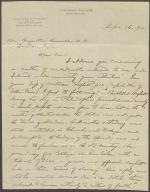
Professor Montgomery Porter Sellers ('93) writes to Augustine Birrell, the Chief Secretary for Ireland, about Birrell’s claim in his book, Life of William Hazlitt, that “the presidency of [Dickinson] College” was offered to Hazlitt in 178


John Dickinson writes to Benjamin Rush and offers the idea for the commission of William Bingham, a trustee, to solicit funds for Dickinson College in England. Transcript included.

William Bingham writes from London to John Montgomery in Carlisle, Pennsylvania. Bingham discusses the prospect of British aid to the new college and comments on the conflict between the United States and the United Kingdom.

Benjamin Rush signs this affidavit that attests that William Ford's payment certificate for service as a soldier is the property of Dickinson College. Ford's certificate, which is worth $80, is no. 77369 and dated July 1, 1784.

Benjamin Rush signs this affidavit that attests that Albion Guest's payment certificate for service as a soldier is the property of Dickinson College. Guest's certificate, which is worth $44, is no. 74942 and dated July 1, 1784.
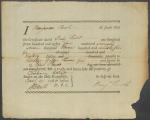
Benjamin Rush signs this affidavit that attests that Arthur [Gillas'?] payment certificate for service as a soldier is the property of Dickinson College. Arthur's certificate is no. 77395 and dated July 1, 1784.

Benjamin Rush signs this affidavit that attests that Christopher Finnigan's payment certificate for service as a soldier is the property of Dickinson College. Finnigan's certificate is no. 75525 and dated July 1, 1784.


Benjamin Rush writes to Thomas Smith of Carlisle, Pennsylvania regarding efforts to raise funds for Dickinson, including a petition to the Pennsylvania legislature for additional financial support. Dr.
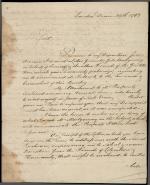
William Bingham writes from London to the Dickinson College Board of Trustees concerning his attempts to get support from the British for the College.

The papers of the Board of Trustees of Dickinson College, 1833-1879, include correspondence, reports, financial statements, printed materials, and legal documents, and have been arranged into thirteen series.
Series 1 – Membership contains correspondence regarding membership on the Board of Trustees, lists of members, and attendance records.
Series 2 – Reports to the Board of Trustees consists of reports by the college president on the overall status of the college as well as reports from the heads of the college departments.
Series 3 – General Business includes bound and loose copies of minutes of the trustees’ meetings, resolutions passed by the various trustee committees, and correspondence in which general business is conducted.
Series 4 – College Personnel includes materials dealing with the college presidents.
Series 5 – Physical Plant consists of deeds, mortgages, certificates, bills, and correspondence dealing with the construction of the campus buildings.
Series 6 – Financial Affairs contains reports of the treasurer, ledger books, student accounts, and other financial materials.
Series 7 – Scholarships contains hundreds of scholarship certificates as well as correspondence and reports related to the sale of scholarships to raise funds for the college.
Series 8 – Conferences consists of materials which pertain to the control of the college by the Baltimore and Philadelphia Conferences of the Methodist Church.
Series 9 – Honorary Degrees contains correspondence relating to the granting of honorary degrees to prominent individuals.
Series 10 – Publications contains printed materials produced for use by the general community such as lists of college rules and regulations.
Series 11 – Dickinson Preparatory School contains reports of the principal to the Board as well as such financial materials as the treasurer’s list of students.
Series 12 – Dickinson Commercial College includes ledger books used in conducting the business of the commercial department of the college.
Series 13 – Executive Committee contains two bound volumes of the minutes of the Executive Committee of the Board of Trustees.
A fuller description of each series is given before each series inventory.
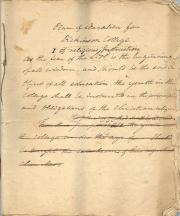
The papers of the Board of Trustees of Dickinson College, 1783-1833, include correspondence, reports, financial statements, printed materials, and legal documents, and have been arranged into seven series.
Series 1 – Membership contains correspondence regarding membership on the Board of Trustees, as well as a membership list, c1826.
Series 2 – Reports of the President consists of reports made to the Board by Presidents Nisbet, Davidson, and How.
Series 3 – General Business contains materials such as correspondence between trustees, mandamus to the faculty, and committee reports.
Series 4 – College Personnel includes correspondence to and from faculty members, including presidents.
Series 5 – Physical Plant contains land deeds and construction and service bills for the campus buildings.
Series 6 – Financial Affairs contains reports of the treasurer, subscription lists, and other financial materials.
Series 7– Publications contains printed materials such as college catalogues.
A fuller description of each series is given before each series inventory.

Thomas Emerson Bond, Sr., was a well-known Methodist Episcopal minister and author who served as a trustee of Dickinson College from 1833 until 1835. The collection includes correspondence to and from Bond dating mostly from 1840-1848, as well as journals and records of the Methodist ministry of John Wesley Bond from 1814-1818. Also included are documents of several Methodist Conferences.

Charles Collins (1813-1875) was a native of Maine and a graduate of Wesleyan University (1837); he served as president of Emory and Henry College (1838-1852), of Dickinson College (1852-1860) and as proprietor and President of State Female College in Memphis, Tenn. (1860-1875). The collection consists of correspondence, financial materials, literary materials, and printed materials. There are only minor amounts of correspondence, financial and printed materials. The bulk of the collection is the literary materials which include diaries, memoranda books, and compilations of sermons. The diaries cover Collins' spiritual life, his early presidency of Dickinson College, his decisions to leave Dickinson, and the effects of the Civil War in Memphis. The diary dated 1842-1874 has very scattered entries while the 1855-1872 diary contains copies of Collins' correspondence. Much of the financial material relates to Dickinson College, including two account books for subscriptions to the college and to a special telescope fund.
Three journals in this collection have been digitized and are available for reading online (see links for related entries below).

The records contained in the President Charles Collins record group pertain only to his time and affairs as president of Dickinson College. As such, no personal papers are included in this record group. For records concerning Collins’ interactions with students, please refer to RG 5/1. The Collins records are arranged into two series: General Business, and Personnel.

The records contained in the President Robert Laurenson Dashiell record group pertain only to his time and affairs as president of Dickinson College. As such, no personal papers or papers pertaining to Dashiell’s time as a student are included in this record group. For records concerning Dashiell’s interactions with students, please refer to RG 5/1. The Dashiell records are arranged into two series: General Business, and Personnel.
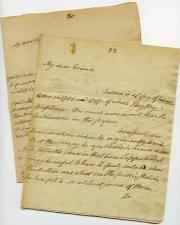
This collection is comprised of correspondence and legal papers reflecting the legal and political career of John Dickinson, statesman and president of the Supreme Executive Council of Delaware and Pennsylvania. The majority of the collection is comprised of correspondence from Dickinson to such prominent individuals as James Wilson, Caesar Rodney, and Benjamin Rush. The collection also contains financial papers and papers related to Dickinson's public duties, particularly to his duties as president of the Supreme Executive Council of Pennsylvania.

John Price Durbin served as president of Dickinson College from 1834 to 1845. From 1842 to 1843 he toured across Europe and the Middle East, and he later published books about his travels. This collection includes a scrapbook that contains an autobiographical memoir as well as items Durbin collected during his travels. There are also several news clippings and engravings.

The papers of John Price Durbin contained within this record group pertain only to the years that he spent as president of Dickinson College, from 1834 to 1845. This includes the papers collected during the period of Durbin's sabbatical, during which Robert Emory served as acting president for one year. The Durbin records are divided into three series: General Business, Personnel, and External Affairs.
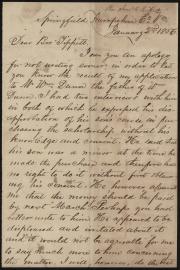
The Education Fund played a critical role in the success of Dickinson College, especially during the mid-nineteenth century. For thirty years, Dickinson was entirely dependent upon the interest from the Education Fund to support its operations. In subsequent decades Dickinson’s Board of Trustees would introduce additional means of raising revenue for the school, but the Education Fund continued to serve as a source of income for the college and its students.
This collection is arranged into six categories as follows: Governance, Correspondence, Finances, Scholarships, Director of Religious Life, and Miscellaneous Materials. Within each category the material is arranged chronologically.